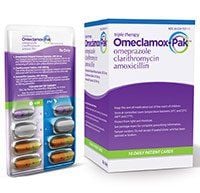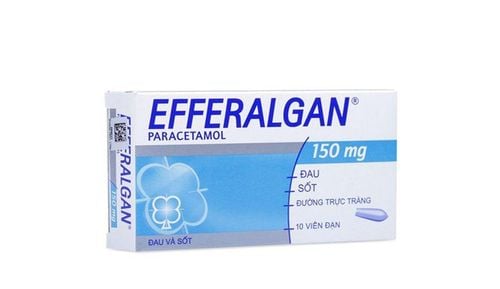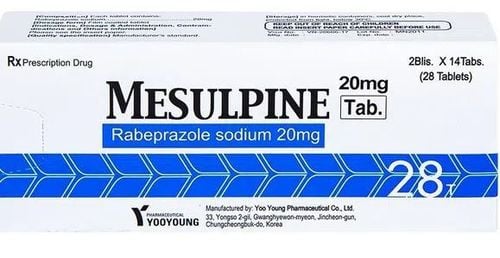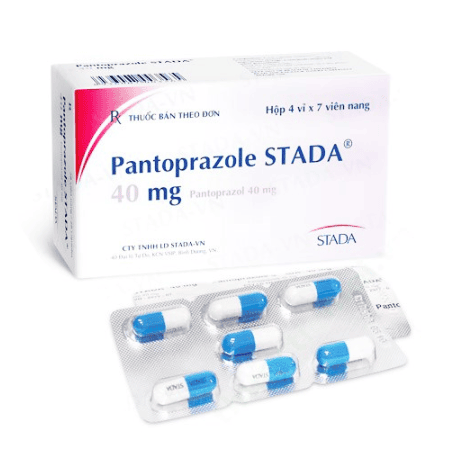This is an automatically translated article.
Helicobacter pylori (H. pylori) is a type of bacteria that can cause ulcers in the lining of the stomach or the upper part of the small intestine. Currently, there are many drugs that can treat H. Does taking medication to treat HP have any side effects?
1. What is Helicobacter pylori?
Helicobacter pylori, also known as H. pylori, is a type of human intestinal bacteria commonly found in the stomach. According to statistics, more than half of the world population contains H. pylori in humans. The majority of people infected with H. pylori have no symptoms and will never develop gastrointestinal problems. However, in some cases H. pylori has the potential to cause a number of health problems for its carrier, including ulcers or even stomach cancer (though less commonly). Experts have yet to find an explanation for why some people with H. pylori develop gastrointestinal problems while others do not.
2. Transmission route and symptoms of Helicobacter pylori infection
2.1. Route of transmission
H. pylori can be transmitted through contaminated food or water. H. pylori causes changes to the stomach and duodenum (the first part of the small intestine). Helicobacter pylori can live in the stomach environment and infect the protective tissue lining the stomach. This leads to the release of certain enzymes and toxins and activation of the immune system. Taken together, these factors can directly or indirectly damage the cells of the stomach or duodenum. This causes chronic inflammation in the wall of the stomach (gastritis) or duodenum (duodenal inflammation). As a result of these changes, the stomach and duodenum are more vulnerable to digestive juices, such as stomach acid.
In the United States and other developed countries, H. pylori infection in children is unusually unusual and much rarer than in adults. However, in developing countries, most children are infected with H. pylori before the age of 10.

H. pylori có thể lây qua đường thực phẩm ăn uống hàng ngày hoặc nước bị nhiễm vi khuẩn
Most people with chronic gastritis or duodenitis have no symptoms. However, some people develop more serious problems, including stomach or duodenal ulcers. Ulcers can cause different symptoms but may also have no symptoms, the most common peptic ulcer symptoms include:
Pain or discomfort (usually in the upper abdomen) Bloating , bloating Feeling full despite eating only small amounts of food Loss of appetite Nausea or vomiting Dark or tarry stools Bleeding sores can lead to prolonged blood loss and fatigue.
Although less common, chronic gastritis can cause abnormal changes in the stomach lining, leading to some forms of cancer. However, because so many people around the world are infected with H. pylori, it is considered an important cause of stomach cancer. According to statistics, people living in countries infected with H. pylori at an early age have the highest risk of stomach cancer.

Nhiễm H. pylori ở trẻ em là tình trạng bất thường bất thường và hiếm gặp hơn rất nhiều so với ở người trưởng thành
3. Helicobacter pylori treatment and side effects of Helicobacter pylori treatment drugs
3.1. Treatment of Helicobacter pylori
People with a history of peptic ulcer disease, active gastric ulcer, or active duodenal ulcer associated with H. pylori infection should be treated. Successful treatment of H. pylori can help ulcers heal, prevent ulcers from recurring, and reduce the risk of ulcer complications (such as bleeding). Experts in the United States and other countries recommend that patients who need long-term anti-inflammatory medications such as aspirin, ibuprofen, naproxen, and similar medications for arthritis and other medical conditions should tested for H. pylori and, if infected, given treatment to kill the H. pylori bacteria.
There is no cure for H. pylori infection. Most of the treatment regimens involved require taking certain medications for at least 14 days.
Most HIV regimens include a drug called a proton pump inhibitor. This medication reduces the stomach's acid production, allowing tissue damaged by the infection to heal. Examples of proton pump inhibitors include lansoprazole (Prevacid), omeprazole (Prilosec), pantoprazole (Protonix), rabeprazole (AcipHex), dexlansoprazole (Dexilant), and esomeprazole (Nexium).
Combination antibiotic therapy is also recommended to reduce the risk of treatment failure and antibiotic resistance.
More and more patients with H. pylori infection are becoming resistant to antibiotics, so it is important to take all prescribed medications and have testing confirm that the infection is gone.
3.2. Side effects of Helicobacter pylori treatment
Up to 50% of patients experience side effects from H. pylori treatment. Side effects are usually mild and statistically, only about 10% of patients need to stop treatment because of drug side effects. For those who experience side effects, the dose or duration of the medication may be adjusted. Some of the most common side effects are described below:
Some treatment regimens use metronidazole (Flagyl) or clarithromycin (Biaxin). These drugs can affect a person's sense of taste. Alcohol should be avoided (eg, beer, wine) when taking metronidazole; This combination can cause skin redness, headache, nausea, vomiting, sweating, and increased heart rate. Bismuth, which is available in some treatment regimens, causes stools to appear black and can cause constipation. Many regimens cause diarrhea and stomach cramps. It is also of concern that up to 20% of patients with H. pylori infection are not cured after completing their first course of treatment. Therefore, they need a second regimen to be able to cure the disease. Second line therapy usually requires the patient to take a proton pump inhibitor for 14 days and two antibiotics. At least one of the antibiotics is different from those used in the first course of treatment.
Follow-up - After completing H. pylori treatment, repeat testing is usually done to make sure that the infection is gone. This technique is usually done with a breath or stool test. Blood tests are not recommended because antibodies detected by a blood test usually remain in the blood for four months or more after treatment, even if the infection has cleared up.

Có tới 50% bệnh nhân bị tác dụng phụ khi điều trị H. pylori
Helicobacter pylori, also known as H. pylori, is a type of bacteria commonly found in the stomach. Most people infected with H. pylori do not show any symptoms. However, some people may experience serious medical conditions such as stomach ulcers. Anyone diagnosed with H. pylori infection must be treated. Treatment of H. pylori helps heal ulcers, reduce the risk of ulcers returning, and reduce the risk of bleeding from ulcers. Experts recommend that all patients treated for H. pylori have their breath or stool checked for two weeks after finishing a treatment regimen. This is done to ensure that the bacteria have been killed. It is recommended that testing be performed 30 days after completion of treatment and that proton pump therapy is discontinued for 1 to 2 weeks prior to conducting exclusion testing.
Early detection of HP bacteria makes the treatment process more effective. Currently, at Vinmec International General Hospital, the carbon isotope 13 C is used in the breath test to diagnose H. pylori bacteria with the most advanced machine with 02 air bags, providing very high diagnostic value. high (> 95%) while ensuring safety for patients. Vinmec not only has a modern physical and equipment system: 6 ultrasound rooms, 4 DR X-ray rooms (1 full-axis scanner, 1 brightener, 1 synthesizer and 1 mammography machine. ), 2 mobile DR X-ray machines, 2 multi-row CT scanners (1 128 arrays and 1 16 arrays), 2 Magnetic Resonance imaging rooms (1 3 Tesla machine and 1 1.5 Tesla machine) , a 2-level interventional angiography room and a bone mineral density measurement room....but also a place to gather a team of experienced doctors and nurses who will greatly assist in the diagnosis and development. early detection of abnormal signs of the patient's body. In particular, with a space designed according to 5-star hotel standards, Vinmec ensures to bring patients the most comfort, friendliness and peace of mind when examining and treating HP bacteria.
Please dial HOTLINE for more information or register for an appointment HERE. Download MyVinmec app to make appointments faster and to manage your bookings easily.
Reference source: update.com












